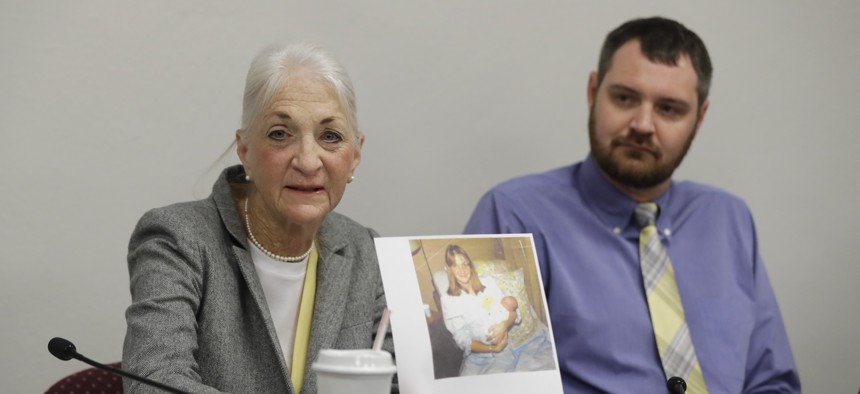States Move to Crack Down on Fertility Fraud

Liz White and her son, Matt White, pushed for a new Indiana law making fertility fraud a crime. Liz White displays a photo of herself and her baby after giving birth. AP Photo/Darron Cummings
In most states, fertility doctors wouldn't face criminal charges for secretly using their own sperm to inseminate patients. Some lawmakers are trying to change that.
An Indiana fertility doctor fathered more than 40 children by secretly using his own sperm to inseminate dozens of patients. In Texas, a woman took a home DNA test to learn about her heritage and eventually discovered that her mother’s fertility doctor was her biological father.
Neither doctor faced criminal charges related to the inseminations—although one was prosecuted for obstruction of justice—because what they’d done was not explicitly illegal under existing law.
Lawmakers are aiming to change that. Indiana Gov. Eric Holcomb signed into law this week a bill that allows prosecutors to charge medical providers with a level 6 felony if they misrepresent “a medical procedure, medical device, or drug” or “human reproductive material,” including eggs and sperm. Potential punishments include a jail sentence of up to three years.
The legislation was filed after fertility specialist Dr. Donald Cline was found to have impregnated dozens of his patients using his own sperm. Because state law did not explicitly prohibit fertility doctors from using their own sperm, Cline faced only two charges of obstruction of justice for lying to investigators. He pleaded guilty and received a $500 fine and a one-year suspended sentence.
Matt White, one of Cline’s biological children, worked with lawmakers to craft the bill and praised its passage.
“We were told there were no laws to charge Cline or others that would engage in similar deplorable actions, and the only thing to do would be to create a law should this issue arise again in the future so the patients and children are protected,” White told WRTV. “This was a team effort full of a lot of sacrifice, dedication, and persistence.”
A similar legislative push is underway in Texas, sparked by Eve Wiley’s discovery that her mother’s doctor—and not the sperm donor she’d come to know as her dad—was her biological father. Wiley contacted Dr. Kim McMorries, who said her mother had consented to his idea to mix “anonymous donor sperm” with the sperm she had selected. Her mother denies that conversation took place, ABC News has reported.
Wiley worked with state legislators in Texas to craft the proposed bill, which would classify fertility fraud as a felony if the perpetrator is health-care provider who “uses human reproductive material from a donor knowing that the other person has not expressly consented to the use of material from that donor.” Punishments include up to two years in jail and a $10,000 fine.
The statute of limitations for pressing charges would be two years after the act is discovered. That provision was necessary, sponsors said, due to the time it would take for cases to be uncovered. (Indiana’s bill contains a similar provision, with a statute of limitations either 10 years past the child’s 18th birthday or 20 years after the insemination occurred.)
"The crime may not be discoverable for quite some time," Texas state Sen. Joan Huffman, the bill’s main sponsor, told the Dallas Morning News.
The bill passed the Texas Senate unanimously and received a favorable report from the House Criminal Jurisprudence Committee.
Lawsuits have been filed in fertility fraud cases in other states, including Vermont and Connecticut. But doctors rarely face criminal charges, as the vast majority of states do not have laws that specifically address these issues. Until this week, California was the lone state with an existing law that prohibits the practice, passed in 1995 after couples there discovered that a fertility doctor was implanting their embryos in other patients without their consent.
The two bills are likely not the last, according to Jody Madeira, a law professor at the University of Indiana. As home DNA kits rise in popularity, more victims may learn of their parentage and file lawsuits which test their states’ laws on the subject.
“Changes for state law tend to be brought by people who are angry that they weren't able to attain accountability,” she told Vice.
Kate Elizabeth Queram is a Staff Correspondent with Route Fifty.
NEXT STORY: Denver Homeless Camping Ballot Initiative Fails





